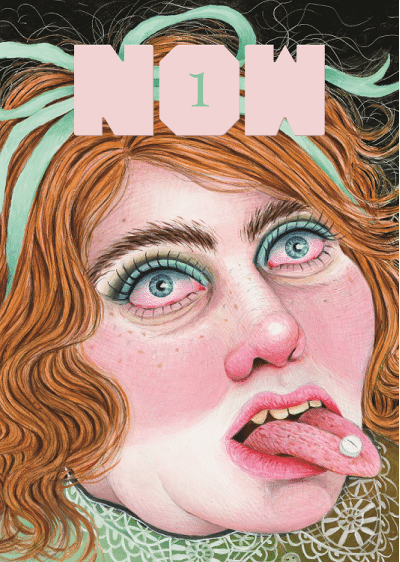Thursday Comics Hangover: Now, for something completely different

The first issue of Now, a quarterly comics anthology from Fantagraphics, begins with a text page that falls just shy of manifesto territory. It's by Now editor Eric Reynolds, and it argues that "The anthology format can be an inherent force for good."
Reynolds makes a compelling argument. Anthologies are a great way for young cartoonists to get exposure and to experiment with styles without committing to a longform project. But nobody's really doing anthologies anymore. It's been years since Fantagraphics last dipped into the format with their gorgeous Mome series of bookshelf-ready paperbacks.
While still very substantial, Now seems more magazine-y than Mome, and that's a good thing: comics anthologies like this should feel of-the-moment and maybe not so permanent. And a good anthology needs a real reason to exist — a point to make, an argument to bear out, a fight to win.
So does Now live up to its name? Is it of the zeitgeist, or is it more of a nostalgia trip for a time when the comics industry was choking on anthologies?
The best comics in Now look like nothing else on the stands. The first page in the book, a strip called "Constitutional" by Sara Corbett, is absolutely gorgeous, a cross between a mannered kid's book from the 1950s and a deck of art deco playing cards. Nothing much happens in the six panels — an old woman and her cat go walking in a city park — but you can't stop staring at it, trying to figure out how a human hand could make something so eerily perfect.
Tobias Schalken's "21 Positions" feels like a magazine illustration from another time. It's just 21 borderless panels of a man and a woman dancing — or are they fighting, or are they fucking, or all three at once? — but as a comic it's something stripped down and raw and totemic. It's hard to pull your eyes from it.
A few comics veterans contribute pieces to Now. In "Scorpio," Dash Shaw tells a story of a couple whose baby arrives on election night, 2016. Gabrielle Bell's "Dear Naked Guy In the Apartment Across from Mine Spread-Eagled & Absent-mindedly Flicking his Penis While Watching TV" is pretty much what it says in the title. (It begins, "I know that you know that I know that you see me seeing you seeing me back.") Neither of these strips feel especially groundbreaking in relation to their respective artists' careers, but they're both haunting little vignettes.
There are 17 different pieces in Now, and they're thematically all over the place. Sammy Harkam's "I, Marlon" imagines the plight of mid-career Marlon Brando as he luxuriates on his private island. "Widening Horizon," by Malachi Ward and Matt Sheean, portrays a parallel history of space travel in a strip that might not be out of place in an especially adventurous issue of Popular Mechanics. Antoine Cossé's "Statue" is science fiction told in loopy, minimalist sketches. You never know what's going to come with the turn of a page, and every reader will find that some pieces of Now work better for them than others. (That's the whole point of an anthology.)
The most successful strips feel like they come from a slightly different universe, one where the lush aesthetics of magazine illustration fused together with comics. Given that magazines are nearly dead now — the Kochs will likely deliver the death blow to the long-suffering medium — it's heartening to see the mannered and deeply designed illustrations from magazine culture's heyday take refuge in the (relative) safe harbor of comics, where cartooning has held sway for over a century.
It's been years since I've seen someone in the comics world draw a line in the sand like this. Even Fantagraphics, which was practically a manifesto-producing factory back in the 1990s, hasn't made a declaration like Now in a while. Hopefully Reynolds will continue to explore this aesthetic in future issues of Now. This first issue proves he has the ambition, but it remains to be seen if the can turn that potential into a movement.